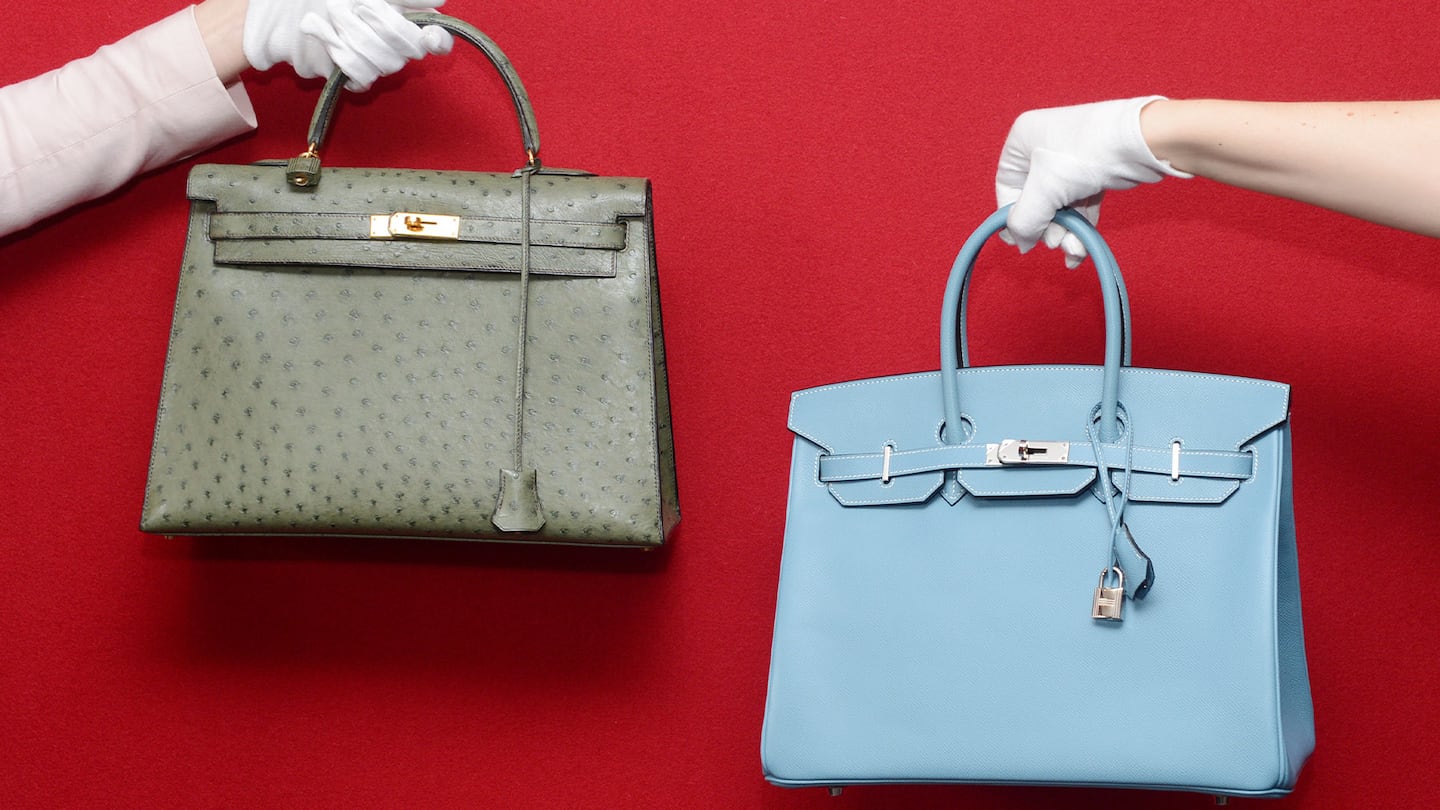
The Business of Fashion
Agenda-setting intelligence, analysis and advice for the global fashion community.

Agenda-setting intelligence, analysis and advice for the global fashion community.

It’s so hard to get your hands on an Hermès Birkin bag it should be illegal.
That’s according to two would-be Birkin buyers who filed a complaint against the French luxury brand in a Northern California district court on March 19.
The pair have accused Hermès of exploiting the “incredible market power” that comes from the “unique desirability, incredible demand and low supply” of its most prestigious bag to drive up prices and increase their own profits. The plaintiffs allege that access to Hermès’ perpetually sold-out Birkin bag is predicated on the purchase of other products, resulting in an “illegal tying arrangement” that violates US antitrust law.
Hermès’ enigmatic selling practices — where the most desirable items like Birkin and Kelly bags are offered intermittently and usually to clients who already have a purchase history at the brand — have been endlessly dissected in fashion circles, and more recently have become the subject of countless TikTok videos and Reddit threads about how to play “the Hermès game,” where creators offer tips on how to get their hands on prestigious Hermès items through carefully coordinated interactions with sales associates.
ADVERTISEMENT
Tightly controlled distribution and scarcity helped make the Birkin one of fashion’s most consistently covetable products and an asset class all its own (prices can more than double at resale). Hermès’ ultra-exclusive positioning has allowed it to keep outperforming the market even as most other luxury brands see demand slowing from post-pandemic highs. Revenue rose 21 percent year-over-year in 2023, while net profit was up 28 percent. But now, it’s potentially landed the brand in legal trouble.
Last year, Hermès told BoF it “strictly prohibits any sale of certain products as a condition to the purchase of others.” Whether the case will go to trial remains to be seen. Still, the complaint could have implications across the industry. Other brands, including Rolex, Chanel and Celine have fielded similar accusations (if not legal complaints), particularly in China, where shoppers have decried rising barriers of entry to sought-after products.
BoF unpacks Hermès’ selling system and what the lawsuit means for the Birkin-maker and beyond.
Like most luxury houses, Hermès tightly controls its distribution — it sells its leather goods only through its own stores, where stock is never marked down. Birkin and Kelly handbags in particular aren’t sold online and sometimes aren’t even displayed in stores.
The brand’s retail experience varies from city to city; local Hermès staff are given a long leash to determine how its handbags — for which demand outstrips supply — are doled out. Some bags are allocated via waitlists, others offered at the sales associate’s discretion (many shoppers vie for attention by trying to seem extra stylish or wealthy). Others are reportedly sold on a first-come-first-serve basis (particularly at the brand’s original flagship store in Paris). Clients’ preferences are registered, but when customers are offered a particular Birkin, they don’t necessarily get to choose the style or colour.
The ambiguity of the process has sparked speculation around who gets a bag and why. TikToks, YouTube videos and Reddit threads on the “Hermès game” detail shoppers’ paths to nabbing so-called “quota bags” (even the most loyal Hermès customers are only allowed to indulge in these styles limited times a year). Creators offer advice on what to say, how to dress and when and where to go to better their chances of scoring. Customers share theories about how much to spend on lipsticks, sweaters, sandals and dog beds to secure an offer or a preferred style — with some estimates climbing into the tens of thousands. Other commentators share reproof for Hermès’ manufactured exclusion of shoppers from already exclusionary-priced products.
“You have to buy their shoes, their pillows … that little $900 horse to show your appreciation for the brand,” said one TikTok user. Another referred to the process as “pledging allegiance to the brand.”
Others tell stories of snagging sought-after bags without spending heavily on other items, suggesting that the alleged practices are not completely systematic — or that the most vocal shoppers are choosing to go overboard (perhaps because they are unwilling to wait months for a bag offer).
ADVERTISEMENT
Hermès can only produce so many of the handbags each year, and it has to decide who gets them somehow.
“[Hermès] is driven by supply, not demand ...” said Erwan Rambourg, global head of consumer and retail research at HSBC. “It is not going to wave a magic wand and suddenly be able to produce a lot of products.”
Saving them for their biggest — or highest-spending — clients could simply be savvy business. Plus, it drives mystique.
The system could help to preserve balance between leather goods and other categories in Hermès’ business — which has long been a priority for the company, as it employs thousands of French artisans specialised in skills like weaving silks, painting enamel bracelets or even silk-screening its leopard-motif beach towels.
A more balanced sales mix and long waitlist for key products help the brand maintain consistency year-over-year, making it more appealing to investors.
Prioritising clients who spend heavily on other categories also could de-incentivise resellers looking to flip bags for a profit.
Those resellers pose a looming challenge for the brand: As more people can get the exact Birkin they want with the click of a button online, Hermès will have to find more ways to drive excitement for its products beyond how hard it is to get them.
Counsel for the plaintiffs (the legal teams at California-based Setareh Law Group and Haffner Law) claim Hermès is in violation of US antitrust regulations that prohibit abuse of market power through bundling goods or tying them to other purchases. Tying occurs when the sale of one product is made on the condition of purchase of another product. A seller also must have enough market power to restrain the free trade of a good. Microsoft, for example, was accused of the same type of antitrust violation for compelling users of its operating system to also use its browser in the 1990s.
ADVERTISEMENT
The lawsuit alleges shoppers are required to buy ancillary products (items like scarves, pillows, shoes or more) before being allowed to purchase a Birkin handbag. Sales associates are “directed to only offer Birkin handbags to consumers who have established a sufficient ‘purchase history’ or ‘purchase profile,’” said counsel for the plaintiff in the complaint. The complaint pointed to the company’s commission structure — where staff allegedly don’t receive payment for sale of a Birkin, but do for other goods — as evidence of the scheme.
Hermès did not reply to a request for comment.
Preferential treatment is a common business practice that doesn’t violate antitrust law, said Susan Scafidi, director of the Fashion Law Institute at Fordham University, who compares it to getting the best table at a restaurant. The plaintiffs have to show that Hermès has specific requirements — whether spending a certain amount or buying a certain number of products over a period of time — nearly every customer must meet before purchasing a Birkin.
The prevailing wisdom on how to get a Birkin suggests there isn’t as clear-cut a protocol. Higher spend across multiple categories is understood to be the best route, but there’s no magic formula. Unpredictability is seemingly built into the “Hermès game.” Stories of walk-in customers nabbing a bag at the Paris flagship could make it harder to prove the existence of a tying scheme. Plus, the bag’s proliferation on the secondary market means a consumer has other avenues for obtaining one, said Scafidi. Presumably, the plaintiffs could buy a Birkin from The RealReal even if they can’t from Hermès directly.
“It’s going to be a really tough case for those plaintiffs to win,” said Scafidi.
Perhaps the bigger issue for Hermès is that the lawsuit opens the brand and its practices up to further scrutiny. The publicity-shy brand is now facing more attention on its selling practices, but also how it maintains balance across the business through sales of ready-to-wear, silk and textiles, watches, jewellery and homeware. Some customers may see it as affirming the item’s exclusivity, but others may be put off by association with allegedly predatory practices.
Hermès will have to respond to the complaint, either with a quiet settlement or making a public statement in a court filing of their own. Whether the case goes to trial will depend in part on how much time and money the plaintiffs want to spend on discovery — gathering evidence and testimony. Because the plaintiffs filed a class action lawsuit, they will also have to get certification from the court that they can represent a class of people who have been treated the same way.
In the meantime, Hermès will need to strike a balance between reassuring sales associates and clients that its practices are legal while avoiding a drawn-out court process which could expose details about their business practices. The suit is a non-issue for most investors, said Rambourg.
Fashion at large will be watching the lawsuit’s progression to gauge the wider implications, as other high-end brands evaluate whether their own tactics could potentially line up with the legal definition of tying.
The industry runs on customer loyalty and luxury houses’ top shoppers are regularly rewarded with access to exclusive gatherings and collections. Chanel has been said to set aside many items for special clients, while watch brands like Audemars Piguet and Patek Philippe also have to find colourful tactics for juggling more clients than they have timepieces to sell. Chinese shoppers even say Rolex dealers have demanded they make purchases at its sister brand Tudor first.
“You buy luxury to be part of the club,” said Rambourg. “That’s what it’s about. It defeats the purpose if the club is open to everyone.”
Regardless of the outcome, the lawsuit is the latest complaint putting how, not just what, brands sell under increased scrutiny, with once-cloistered transactions now the subject of public — and legal — debate.
The brand is being accused of unlawful ‘tying’ for allegedly requiring shoppers to buy ancillary items from other product categories before they were allowed to purchase the brand’s sought-after Birkin bags.
Fourth-quarter sales at the leather goods powerhouse rose by 18 percent, defying the wider slowdown in luxury demand.
‘Quiet luxury’ may have waned on TikTok, but strong results at Zegna, Brunello Cuccinelli and Loro Piana suggest demand for discreet propositions has staying power.
How a unique approach to supply chain, design, communications and retail has powered blockbuster demand for iconic bags like the Birkin and Kelly, enabling the French leather goods house to face down rivals and become a global megabrand with a market capitalisation greater than Nike’s.

Joan Kennedy is Editorial Associate at The Business of Fashion. She is based in New York and covers beauty and marketing.
The designer has always been an arch perfectionist, a quality that has been central to his success but which clashes with the demands on creative directors today, writes Imran Amed.
This week, Prada and Miu Miu reported strong sales as LVMH slowed and Kering retreated sharply. In fashion’s so-called “quiet luxury” moment, consumers may care less about whether products have logos and more about what those logos stand for.
The luxury goods maker is seeking pricing harmonisation across the globe, and adjusts prices in different markets to ensure that the company is”fair to all [its] clients everywhere,” CEO Leena Nair said.
Hermes saw Chinese buyers snap up its luxury products as the Kelly bag maker showed its resilience amid a broader slowdown in demand for the sector.